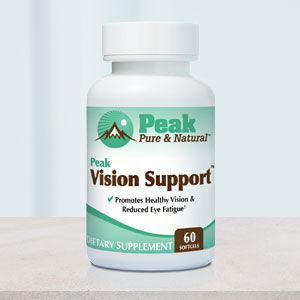Get Easy Health Digest™ in your inbox and don’t miss a thing when you subscribe today. Plus, get the free bonus report, Mother Nature’s Tips, Tricks and Remedies for Cholesterol, Blood Pressure & Blood Sugar as my way of saying welcome to the community!
Supplementing for healthy eyes and vision

Of all our senses, vision may be the one most associated with independence.
Many of us shudder at the thought of vision loss. How would we get around? How would we experience the world?
We go to great lengths to preserve our eyesight, like undergoing surgeries to correct glaucoma, cataracts and other eye conditions.
One of the keys to understanding eye health is to expand our thinking from considering the eyes in isolation, to realizing that eye health is a systemic issue…
Habits like smoking, and conditions such as obesity, diabetes, high cholesterol and high blood pressure have a direct negative impact on eye health. The damage done to cellular health by oxidative stress and resulting inflammation seems to be the main driving factor in the deterioration of eye health — as it is with nearly every other chronic, degenerative disease.
Fortunately there are many ways to preserve eye health. A number of studies have shown how specific nutrients, foods and botanicals can help protect us from eye disease and support strong vision as we age. We have a wide array of whole foods and supplements available to choose from.
Nutrients and macular degeneration
In 2001, the National Eye Institute, one of the National Institutes of Health, released a study documenting how people at risk for macular degeneration respond to specific nutrients. Macular degeneration happens when cells in the macula, a small structure in the retina at the back of the eye responsible for central vision, begin to degenerate. Age and family history play significant roles, along with previously mentioned risk factors. There are several types of macular degeneration, with limited treatment options to slow deterioration, but the condition thus far is considered incurable. Macular degeneration is the leading cause of central blindness.
In the study, participants were given specific doses of vitamins, C and E, beta-carotene and zinc. Results suggested that these supplements reduced the risk of developing advanced macular degeneration by 25 %. This research furthered our understanding of how nutrition can directly affect eye health, supporting the use of nutritional interventions for preserving vision as we age.
Carotenoids
Eyes respond particularly well to a family of antioxidants called carotenoids. One in particular, lutein, is even called “the eye vitamin.” Lutein is found in high concentrations in broccoli, kale, spinach, grapes, egg yolks, oranges and zucchini, to name some common foods.
Another carotenoid, which is often used together with lutein, is zeaxanthin, found in vegetables like broccoli, spinach and kale. Lutein and zeaxanthin seem to protect plants from high intensity light, particularly ultraviolet waves, and may perform the same function in the eye. In addition, lutein and zeaxanthin seem to be particularly effective when taken with vitamin E. They have been found to protect the eye from both macular degeneration and cataracts, and also exhibit anti-cancer activity.
Perhaps the best known carotenoid is beta carotene, a natural precursor to vitamin A. Like other carotenoids, beta carotene is often found in green leafy vegetables, as well as carrots and other orange produce like pumpkin and sweet potato. Carotenoids absorb better when eaten with healthy fats, such as those in olive oil and raw nuts.
Antioxidants and vitamins
Antioxidants and related nutrients in general are important for controlling inflammation and keeping cells and tissues functioning optimally. But when it comes to eye health, their protective powers become especially critical. One study, which reviewed more than a dozen trials, found that supplement-based antioxidants can slow macular degeneration. These included antioxidant vitamins C and E, as well as zinc which performs tasks necessary to process other antioxidant compounds in the body.
Beyond carotenoids and vitamins like A, C and E, there are a number of other antioxidants to look at, such as lycopene and glutathione.
Another excellent supplement is honokiol, a potent antioxidant that demonstrates in preclinical studies free racial scavenging abilities more powerful than vitamin E. Derived from Magnolia bark, honokiol has also been shown to control inflammation and support relaxation and a healthy mood.
I also recommend an ancient Tibetan herbal formula with 19 botanicals such as neem, costus root and Icelandic moss, many of which are highly regarded for their antioxidant properties.
A proactive approach to eye health can be as simple as incorporating antioxidant-rich nutrients into our diet. By balancing our intake of colorful fruit, green leafy vegetables, eggs and food-based antioxidant supplements, we can create consistency and synergistic benefits with our health plan. The results are not just better vision, but greater overall wellness and vitality – you’ll see it in your eyes.
For more health and wellness information, visit www.dreliaz.org
Editor’s note: Regain your health and enjoy a full, vibrant life by defeating the real culprits of premature aging and sickness — excessive, damaging acid in your body! The truth is when you’re alkaline, wellness thrives and sickness takes a dive. Click here to discover The Alkaline Secret to Ultimate Vitality!














